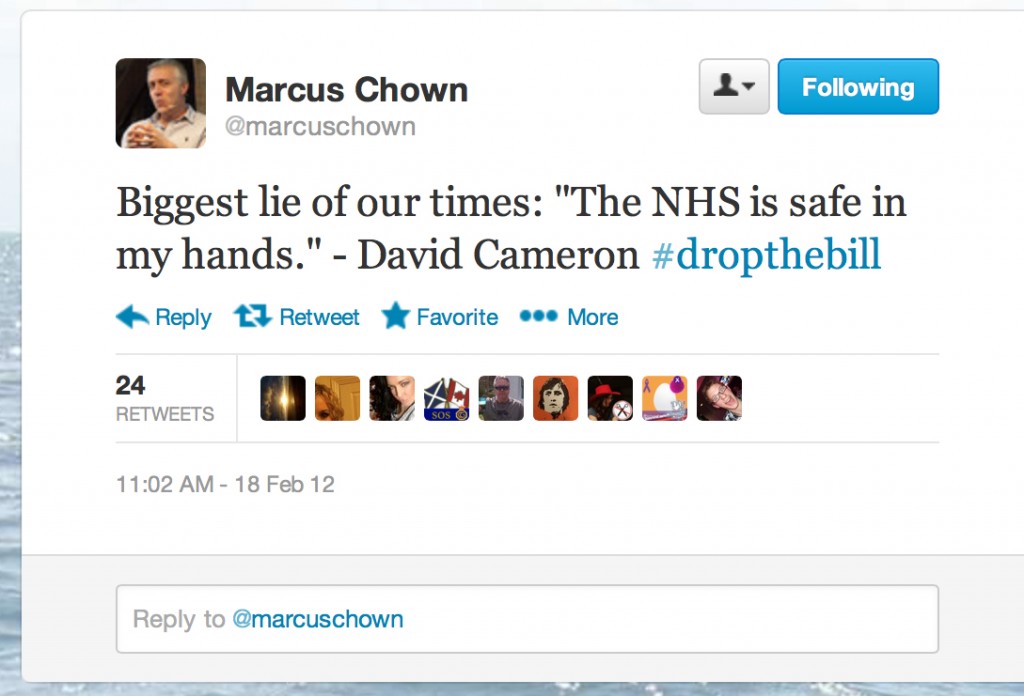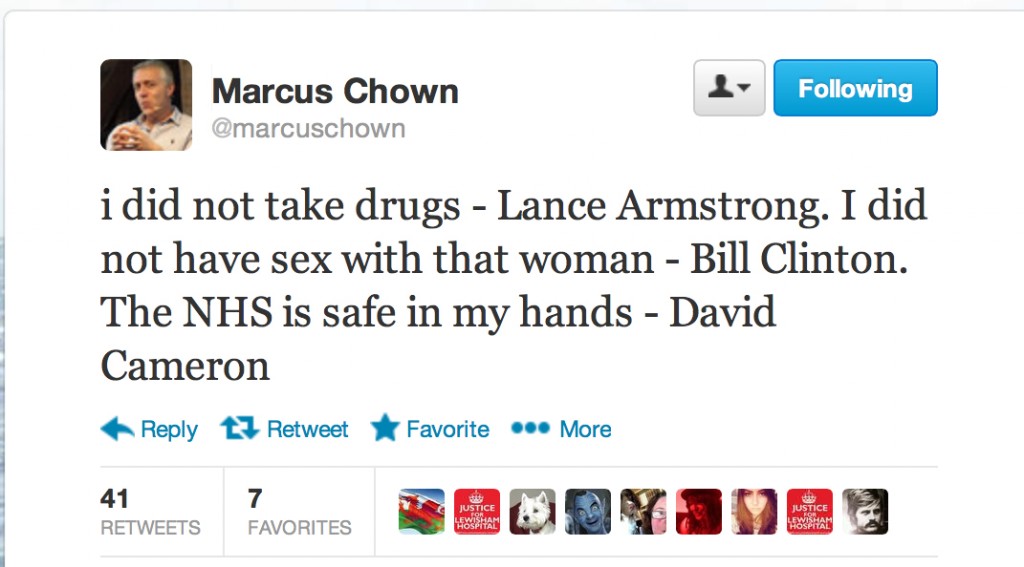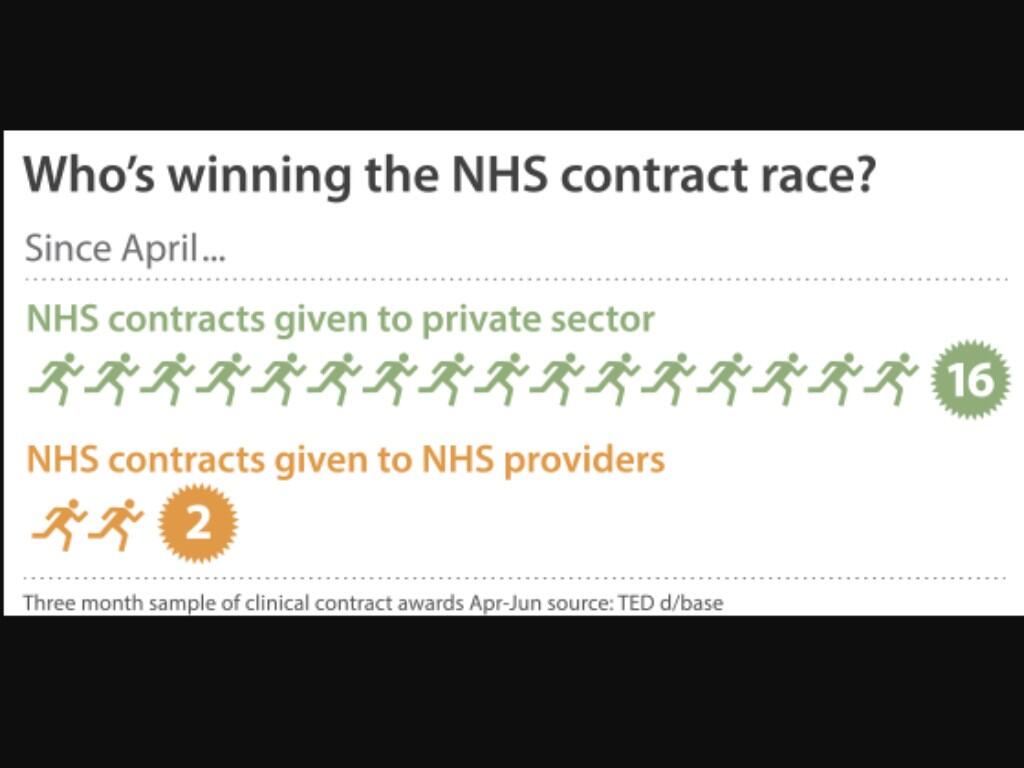The problem with the mantra, “The NHS is safe in our hands”, is that it sums up a lean-management approach to management of the NHS. Whilst heralded by some as a ‘success’ in the National Health Service as an efficient way of doing things, its reputation in the private sector is rather more notorious. It is associated with a ‘just-in-time’ approach, where things are always done at the last minute. Where there is relevant to operations management is that if anything untoward happens the system becomes quite unable to cope. Take for example a major road traffic accident, or any similar clinical incident.
Labour will ultimately wish more than the basic aspiration that “NHS is safe in its hands”. This would be like me reassuring you if you asked me to childmind your baby, “You can rest assured that I won’t kill your lovely baby tonight.” And yet possibly expectations for the NHS have become rather low. The formidable campaigner, Marcus Chown, has a tweet which you often see in circulation thus:
Take for example this tweet from 18 March 2012:
 Many accept this claim to be a bare-faced lie. The idea that David Cameron and the Conservative Party are simply pathological liars about the NHS is not new. They intended a full-blown reorganisation of the #NHS prior to coming into Government, and yet stubbornly refused to put it in their 2010 manifesto. Further to this, Cameron has previously made pledges to save A&E hospitals which his Government has subsequently shut down, and yesterday did a full-frontal U-turn on minimum pricing in alcohol. In terms of currency in credibility, Cameron needs to ‘sell, sell, sell’, encapsulated in the spirit of another famous tweet by Marcus Chown:
Many accept this claim to be a bare-faced lie. The idea that David Cameron and the Conservative Party are simply pathological liars about the NHS is not new. They intended a full-blown reorganisation of the #NHS prior to coming into Government, and yet stubbornly refused to put it in their 2010 manifesto. Further to this, Cameron has previously made pledges to save A&E hospitals which his Government has subsequently shut down, and yesterday did a full-frontal U-turn on minimum pricing in alcohol. In terms of currency in credibility, Cameron needs to ‘sell, sell, sell’, encapsulated in the spirit of another famous tweet by Marcus Chown:
 Again, it’s a case maybe of, “If I were starting now, I wouldn’t go from here.” But we’re now stuck with the Health and Social Care Act (2012), that is until Labour decides to repeal it. However, that as we all know is only part of the story. Removing the 50% of cap from private income (section 164(1)(2A)) and redrafting the Regulations associated with procurement such that the default option is not price competitive tendering (section 75) should be the relatively easy parts. There’s still the problem for all parties of how the NHS can be legislated for integration, as strictly speaking bundling offends EU competition law if it distorts trade.
Again, it’s a case maybe of, “If I were starting now, I wouldn’t go from here.” But we’re now stuck with the Health and Social Care Act (2012), that is until Labour decides to repeal it. However, that as we all know is only part of the story. Removing the 50% of cap from private income (section 164(1)(2A)) and redrafting the Regulations associated with procurement such that the default option is not price competitive tendering (section 75) should be the relatively easy parts. There’s still the problem for all parties of how the NHS can be legislated for integration, as strictly speaking bundling offends EU competition law if it distorts trade.
Ed Miliband has been deeply immersed in a debate about party funding and transparency. Whilst Matt Forde claimed this week on “This Week”, the flagship politics show presented by Andrew Neil, that the Unions to have a “strangehold” on the Labour Party, it is not terribly certain how robust Labour’s opposition to Royal Mail privatisation will be. It is also noteworthy that UNISON violently opposed the ‘Private Finance Initiative’, admittedly brought in through Ken Clarke and John Major in the mid 1990s, but which Labour (and the Conservatives) have subsequently embraced. The loans for PFI have benefited the private sector, and the funding of NHS Foundation Trusts via this route has led some lawyers representing these trusts to withhold vital information such as staffing levels on the grounds that such information is “commercially sensitive”.
Therefore, Labour, even if offers a ‘safe alternative’ to the funding gap and the mechanism of procurement in a future Government, does not offer anything startingly different on the Private Finance Initiative. This would not matter if this issue was completely unknown to voters, but the issue is very well known. Some members of the public know that it is known as ‘off ledger accounting’, and that City firms are still very positive about it. Andy Burnham MP has long argued that the PFI was essential for improving the infrastructure of hospitals, e.g. spanking new businesses, but this is small beer for wards and NHS services being stripped to the bone. NHS Trusts being run with a skeleton staff at full capacity, such that Doctors and nurses feel they can’t cope, are becoming commonplace. This is as being justified in terms of the ‘necessary’ £20bn of NHS savings which have to be found until 2020 at least. No party wishes to challenge these savings, and that is partly the reason they find Sir David Nicholson a useful lightning conductor. He is the natural conduction rod for public anger, and indeed the Daily Mail’s anger, whereas all that is happening is that the messenger is being shot, and another messenger will possibly take over next year, for example Mark Britnell.
Labour does not wish to challenge the idea that the NHS is being stripped of necessary funds to do the job properly. If the demands from ageing and technological advances have increased as Nicholson and others claims, surely it is unfeasible to maintain the same level of service when you are barely changing the budget in incremental terms from year to year? Labour’s failure to challenge this dogma is at the heart of its other failings. It cannot embrace the disasters at Mid Staffs and Morecambe Bay while it is fully signed up to efficiency savings. Nobody can deny that any large organisation needs to be run at maximum productivity and efficiency, but when there is consistent robust evidence that adequate numbers of Doctors and Nurses saves lives this is a problem. Labour’s new line of attack is that the “hedgies” (hedge funds) have a strangehold on Tory policy, a weapon utilised to great effect by Ed Miliband in Prime Ministers’ Questions only this Wednesday (10 July 2013). It is a poorly kept secret that private sector entities made massive donations to the Conservative Party prior to the 2010 General Election, and as a result of the new NHS legislation, this situation latterly appeared (source):
For all the ranting by the Conservatives and Labour about “choice”, ultimately voters seem to have little choice where it matters. Citizens of Trafford and Lewisham appear to have little choice over their A&Es locally shutting. Reconfigurations seem to happen from Jeremy Hunt with little consultation with the public. Labour’s public opposition to these distressing reconfigurations seems to be minimal, in a way almost to suggest a collusion with the Government agenda to “reconfigure to save money”. And the dogma of the efficiency savings from the Department of Health goes unchallenged, including the surplus returned to the Treasury, in parallel to the big ticket numbers expenditure-wise going unchallenged. How come it’s possible to find the billions of HS2, another initiative which few people remember ‘voting for’, which has a dodgy business plan, and yet is unanimously agreed upon by all parties (like PFI)? It has become unacceptable to challenge anything coming out of the private sector, whether it’s the efficiency savings advised by McKinsey’s who have been advising on re-disorganisations since time began, well certainly since 1974 anyway. Coupled with this with toothless regulators (and in the CQC’s case a regulator which is allocating resources to protect its own reputation and whose own Report it is alleged is a ‘cover up of a cover up’), it is possible that the damage done by efficiency savings will go unnoticed. If the focus remains on reputational succes of NHS Trusts, and the reputational success of politicians of all ilk, any collusion between the Regulators and politicians to achieve NHS Foundation Trust will be disastrous. Andy Burnham has vehemently denied that there has been any such pressure thus far, but the future of the NHS Foundation Trust is highly relevant. Despite it being a noteworthy policy failure in Spain, the widespread conversion of hospitals to NHS Foundation Trusts could be the perfect stepping stone for super-hospitals, and in a market where supplier power is King, they may prove yet to be the perfect vehicle for the final part of NHS privatisation.
The thing is while it is easy to hide poor financial performance of the hospital, and this is after all the metric that will pay the salaries of CEOs in NHS Foundation Trusts, it is alarmingly easy to hide morbidity and excess mortality of NHS hospitals. Nobody wants to go into hospital to put their own life at risk, and yet we have this ludicrous situation, generated by all the political parties, where nobody accepts blame, and senior managers are in a ‘revolving door’ around the system with generous rewards for, ultimately, failure. The idea of the National Health Action party being the next Government is frankly ludicrous, which is why it is all the more important that Labour can strengthen its relationship with the Unions. However, the efforts of the NHA Party in putting this crucial agenda on the map are completely worthwhile if they move forward from being simply a ‘party of protest’. Maybe despite having been born out of the Unions to represent workers in Parliament, Labour does not feel that it should offer unfair advantage to the Unions, but this would be catastrophic in policy terms. The “democratic deficit” on the NHS is extremely bad, with the general public and the medical professions completely ignored on a range of issues, most recently plain packaging of cigarettes and minimum alcohol pricing. It’s the singularly obsessional Labour phobia of the perception of its relationship with the Unions with the right-wing press which means that it too might easily go down the route of being susceptible to powerful corporate lobbying over diet, alcohol, smoking, and the such like. This stems from the basic issue of turning the NHS into a profitable business, as a “wealth creator”. It is a world apart from “The Spirit of 45″, and Labour knows that it is sitting on an extremely comfortable lead of about 10% compared to the Conservatives.
Labour has to learn not to abuse this public faith in it regarding the NHS, and take a “second look” at NOT embracing a neoliberal, un-evidence based approach to medicine. It, like the NHS, has to learn from failure. Whilst whole-person or integrated care is important, it must never become, fundamentally, distraction therapy from the threats still posed by PFI and efficiency savings. Labour has been desperate for the Risk Register to be published, but it is highly likely that the Risk Register will also expose failures from their watch in Government.
It’s not the case that Labour is ‘sleepwalking’ into a disaster. It already has sleep-walked into a disaster, and it’s high time to retreat. Soon, it will be the case, at best, that people are not wishing to vote Labour over the NHS, but they represent “the best of a bad bunch”. Yet this ironically is entirely in keeping with the “just in time” philosophy of doing the rock bottom or “more for less”. Labour appears to be suffering from a ‘poverty of aspiration’, and whilst the emphasis in policy seems to be one of ‘equality of opportunity’ for profit-making healthcare private providers, it is this poverty of aspiration that might ultimately kill the NHS.
The author can easily be contacted on Twitter @legalaware.



